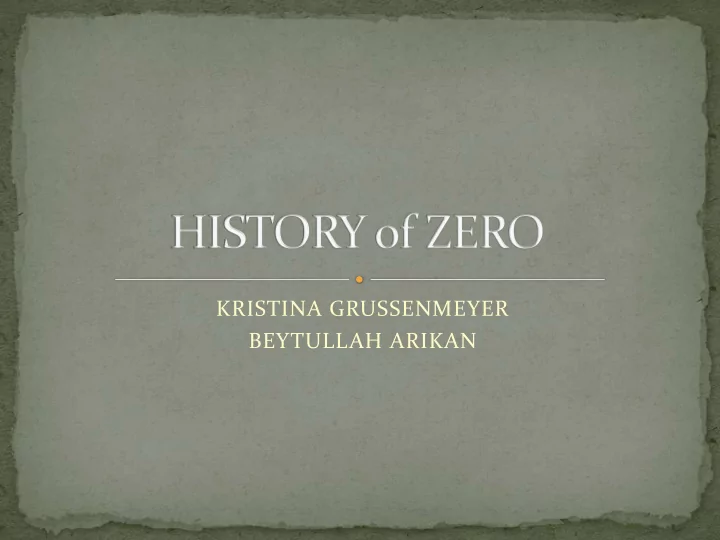

KRISTINA GRUSSENMEYER BEYTULLAH ARIKAN
3 rd BC 1 Babylonians 3 rd AD 2 Mayans 4 th AD 3 Indians 7 th AD 4 China 5 Islamic Countries 10 th AD 12 th AD 6 Europe
Sexigesimal numeration- Base 60 5 crescents + 4 wedges = 54
The number 124 (2 sixties + 4 ones) The number 1856 (30 sixties + 56 ones)
How would you show the number 64 ? How would you show the number 3604 ? • 3604 is 1 "60 squared" + 4 ones but nothing in the sixties column. • scribes started leaving a blank space • sometimes it was a pretty small space • One scribe put in a symbol that already existed as a separator in literature
top : 64 (1 sixty + 4 ones) bottom : 3604 (1 sixty2 + 0 sixty + 4 ones)
Just a place holder Despite the invention of zero as a placeholder, the Babylonians never quite discovered zero as a number. Not a separate entity
The Mayans, native inhabitants of Central America, were highly skilled mathematicians, astronomers, artists and architects. They had a very complex calendar system and needed a placeholder in their elaborate date system. This lead to their invention of zero — 600 years and 12,000 miles removed from the Babylonians.
The Mayans had several calendars. There was a 365 day civil year, a 260 day religious year and, key to their invention of zero , the complicated Long Count calendar which measured time from the start of the Mayan civilization (August 12, 3113 B.C.) and completes a full cycle on December 21, 2012. The Mayan numerals were very complex in formal use — painted or carved heads or even full figures were used to represent numbers.
Zero was used to denote an empty place. A striking note about the Hindu zero is that, unlike the Babylonian and Mayan zero , the Hindu zero symbol came to be understood as meaning “nothing.” This is probably because of the use of number words that preceded the symbolic zero .
rules for arithmetic involving zero 0-a=a 0/a=0 0+a=a a/0=0 0+0=0 0/0=0 0-(-a)=a a*0=0 0-(+a)=-a a-0=a 0-0=0
Bhaskara wrote over 500 years after Brahmagupta. Despite the passage of time he is still struggling to explain division by zero. He tried to solve the problem by writing n /0 = ∞ He correctly state other properties of zero, however, such as 0 2 = 0, and √0 = 0.
The Indian ideas spread east to China. Ch'in In 1247 Chiu-Shao Mathematical treatise in nine sections which uses symbol O for zero Zhu Shijie wrote Jade mirror of the four elements which again uses the symbol O for zero.
China independently invented place value: they didn’t make the leap to zero until it was introduced to them by a Buddhist astronomer (by way of India) in 718. Although it seems strange to image a place value system with no place holder for “nothing,” it makes perfect sense when you see the Chinese method for writing and calculating numbers. The Chinese used a counting board to do their math, and an additive system to write their numbers. Any missing places were left blank on the counting board. After the introduction of the zero symbol, the counting board could be retired.
Al'Khwarizmi describes the Indian place-value system of numerals based on 1,2,3,4,5,6,7,8,9 and 0. This work was the first in what is now Iraq to use zero as a place holder in positional base notation. Many Europeans learned about essential role of zero and the decimal place value system from Latin translations of his books.
The Hindu-Arabic numeral system (base 10) reached Europe in the 11th century, via the Iberian Peninsula through Spanish Muslims. Introduced in Europe in the Middle Ages Introduced in Europe by Leonardo Fibonacci. Translation from Al-Khwarizmi 1 2 3 4 5 6 7 8 9 0
• 3BC – 2BC Babylonia • 3AD – 4AD Maya • 4AD – 5AD India • 7AD – 8AD China • 9AD – 10AD Arabia • 11AD – 12AD Europe
Math Through Ages 79-83 me-damitr.blogspot.com/2008/04/zero.html , sep 08 09,13:00 http://www-history.mcs.st- andrews.ac.uk/HistTopics/Zero.html , Sep. 01. 09. 20:30 http://www.mediatinker.com/blog/archives/008821.html , Sep. 01. 09. 20:30 http://en.wikipedia.org/wiki/0_(number)
Recommend
More recommend